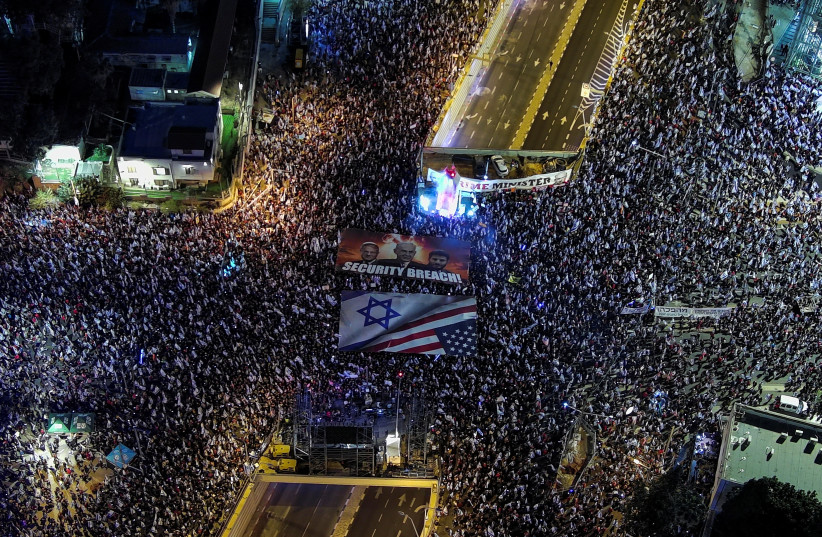As part of the protest against the government and judicial reform, on Tuesday morning, the "Day of Resistance and National Opposition" took place in multiple locations throughout the country.
The day is expected to include traffic disruptions, marches, and large demonstrations in Tel Aviv and other cities. Train disruptions and assurances for a "broad operation": The updated schedule for the "Day of National Opposition."
One of the protest leaders ahead of the Day of Resistance, Dovi Young, an international expert on national identity, spoke on Tuesday morning with Gideon Oko and Guy Peleg and shared his perspective.
Speaking on the 'Day of Resistance'
"There are onlookers on the side, sitting on the fence, and there are those who need to solve all this mess - the police," Young clarified at the beginning of the conversation.

"We received the letter from the commissioner yesterday, which was sent in the middle of the night, and I am very disappointed. What she did was to fill seven pages with all sorts of words, all sorts of paragraphs, and that's it. I wanted her to say that we need to act according to the law, period. That's it. We have a legal system in the police, we have several legal clauses of laws that deal with disturbances of order."
He further argued that "the police, contrary to what we feel, want, and all of us great advisers, need to find a balance. It is allowed and necessary to allow citizens to protest; the issue is that there are also definitions for a protest, and any protest over 50 people requires a license."
In response to his statements, Peleg questioned whether, in his opinion, the police do not deploy enough force, and Young emphatically replied, "Clearly they don't. There is no reason in the world, in the balance system according to the law, that a small noisy minority should have any effect."
Peleg added and asked how, in his opinion, they should handle a situation if not by using force that "fills Ichilov with casualties," according to the words of Ami Eshed.
Young explained, "How exactly has it been handled since Ami Eshed resigned, was fired, or left? Those same officers of his who were frustrated for 27 or 28 weeks, received a different command, and within a minute started to act differently. Why? Because all the officers are trained in advance of disruption of order."
"In the police, there is a lack of 8,000 officers. When 8,000 officers are missing, it affects preparedness in everything, in attacks and in preparedness for protests. The Israel Police operates over 100,000 officers every day during such a disturbance. Even today, thousands are deployed, those who have already been working day and night for 29 weeks.
"To handle axis number two, the police need to find a balance because, on the other hand, it is allowed to protest, a fundamental right. On the other hand, the public has rights. The police officer or commander needs to decide at what point the public's right to protest is compromised against the public's right," he emphasized.
Additionally, when the presenters mentioned last week's dispersal of the demonstration, where one of the protesters was injured by a rubber bullet, Young remarked, "I didn't see any violence; I saw the use of force. He wasn't fighting for anything, he is fine and everything is in order. He protested, and he returned to the field. To operate in a disruption of order, they warn the public, they tell them 'you are in an illegal demonstration,' they give them time to disperse, give them more time, then the water cannon arrives... There is a whole process.
"Those who violate the law and remain on the road, if the guys are breaking the law, despite police warnings, they must use reasonable force to disperse them. If we threw a grenade, you would say 'They've gone crazy,' if they shot sponge rounds, you would come with the same claim. You have to understand - there is police violence; it is on the fringes and is examined by the Department of Internal Investigations. The police use force in accordance with their authority," he concluded.
